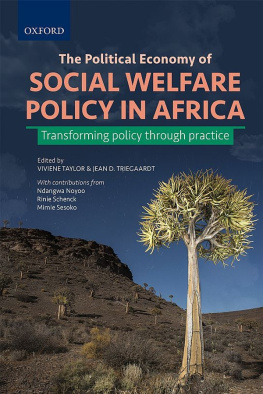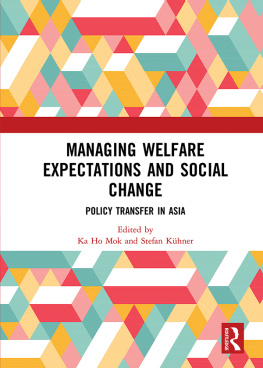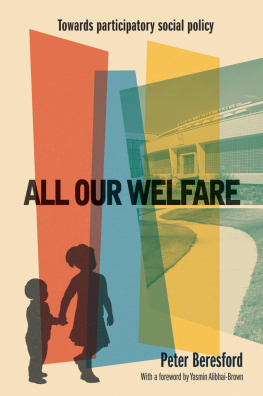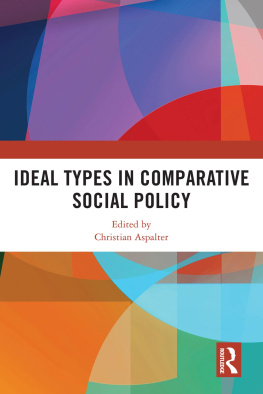The Political Economy of
SOCIAL WELFARE POLICY IN AFRICA
Transforming policy through practice
The Political Economy of
SOCIAL WELFARE POLICY IN AFRICA
Transforming policy through practice
Edited by
VIVIENE TAYLOR & JEAN D. TRIEGAARDT
With contributions from
Ndangwa Noyoo
Rinie Schenck
Mimie Sesoko


Oxford University Press is a department of the University of Oxford. It furthers the Universitys objective of excellence in research, scholarship, and education by publishing worldwide. Oxford is a registered trade mark of Oxford University Press in the UK and in certain other countries.
Published in South Africa by
Oxford University Press Southern Africa (Pty) Limited
Vasco Boulevard, Goodwood, N1 City, Cape Town, South Africa, 7460
P O Box 12119, N1 City, Cape Town, South Africa, 7463
Oxford University Press Southern Africa (Pty) Ltd 2018
The moral rights of the author have been asserted.
First published 2018
All rights reserved. No part of this publication may be reproduced, stored in a retrieval system, or transmitted, in any form or by any means, without the prior permission in writing of Oxford University Press Southern Africa (Pty) Ltd, or as expressly permitted by law, by licence, or under terms agreed with the appropriate reprographic rights organisation, DALRO, The Dramatic, Artistic and Literary Rights Organisation at . Enquiries concerning reproduction outside the scope of the above should be sent to the Rights Department, Oxford University Press Southern Africa (Pty) Ltd, at the above address.
You must not circulate this work in any other form and you must impose this same condition on any acquirer.
The Political economy of social welfare policy in Africa: Transforming policy into practice
Print ISBN: 978 0 19 907647 5
ePUB ISBN: 978 0 19 907516 4
First impression 2018
Typeset in Utopia 9.5pt on 12pt
Acknowledgements
Publishing manager: Alida Terblanche
Publisher: Marisa Montemarano
Project manager: Gugulethu Baloyi
Editor: Revenia Abrahams
Designer: Jade Benjamin
Typesetter: Chris Leo
Indexer: Tanya Paulse
Cover design by: Judith Cross
; p. 241 Paul Weinberg/South Photos/Africa Media Online; p. 245 Pictorial Press Ltd/Alamy Stock Photo; p. 246 Sowetan/Times Media Digital Archive/Africa Media Online; p. 262 Graeme Williams/South Photos/Africa Media Online; p. 291 Adwo/Shutterstock.
The authors and publisher gratefully acknowledge permission to reproduce copyright material in this book. Every effort has been made to trace copyright holders, but if any copyright infringements have been made, the publisher would be grateful for information that would enable any omissions or errors to be corrected in subsequent impressions.
Links to third party websites are provided by Oxford in good faith and for information only. Oxford disclaims any responsibility for the materials contained in any third party website referenced in this work.
Abridged table of contents
Table of contents
Policy of 1997 link?
3.2.3.1 The enterprise approach
4.6.1.3 Developmental social welfare
8.7.1 Traumatic experiences and losses
9.6 Family Policy in South Africa
12.6 Legislative framework for older persons
Conclusion

I appreciate the opportunity to write the foreword for this book, The Political Economy of Social Welfare Policy in Africa 1st edition, and to explain why I consider it important and timely, and why, in my view, it is destined to be a reference for social service professionals, scholars, and policymakers in years to come.
First, the chapters in the first part of the book argue for a paradigm shift in how social welfare policy is understood and explain why a transformative approach is essential. This is done by using a political economy framework to analyse the evolution of social welfare policy as a response to the most pressing social and economic deprivations experienced by people in Africa. Using some countries in sub-Saharan Africa as examples, and particularly South Africa, it points out the intersections among political and economic choices made by governments over time and the consequences of these choices when governments and states fail people. Chapters in this book highlight the complexities of the political economy of Africa with its roots in a long history of conquest and struggles against imperialism, colonial and postcolonial processes. However, despite the history and complex political and economic features that make life incredibly hard for the poorest people on the continent, some chapters point out that there is growing impetus towards a more human rights and transformative approach to social welfare policy in countries in the region.
experiences of people in a regional and global context that is dominated by neoliberal financial and economic globalisation.
Second, the political economy approach used to analyse social welfare policy is not only groundbreaking but also moves away from conservative and orthodox approaches that do not effectively tackle structural forces and other impediments to societal well-being, especially those which are embedded in countries colonial and postcolonial histories. This book is ambitious on another level. It squarely addresses the questions that, to a large extent, explain the social welfare policy failures of governments in eradicating poverty, and reducing inequalities, unemployment, hunger, and malnutrition. Instead of maintaining the status quo with regard to policies and professional practice in the social services, this book provides the knowledge base and techniques to enable policymakers and scholars to critique inequitable and unjust systems and to propose alternatives to such systems.
Third, chapters in this book argue for a new approach to scholarly work in social welfare policy and social development and provide the theories, experiences and knowledge that provide a much needed shift away from palliative and status quo approaches to an approach that critically engages with why poverty, inequalities, vulnerabilities and risk persist in postcolonial, independent African countries. The historical analysis that comes with this political economy approach to social welfare empowers policymakers, practitioners, and students to understand the ravages of capitalism and political intolerance in Africa and counter these with a transformative approach.
The editors of this book compel us to look beyond the surface and to change the way we understand social welfare policy and the paradigms we use to address the persistent problems of poverty, social inequalities, and vulnerabilities in our country. This is not surprising. Viviene Taylor is one of the foremost social policy experts in South Africa and has shaped democratic South Africas social policy significantly. Her pioneering work on comprehensive social security for South Africa laid the basis for a transformative social protection system that improves the lives of the majority of the poorest citizens. Given her work on social protection in Africa for the African Union, on the National Planning Commission, her role as Chair on the Review of the White Paper for Social Welfare Policy (1997), and her work on the High Level Panel Review of Key Legislation in South Africa, Prof Viviene Taylor is particularly well placed to identify and analyse policy, legislative and accountability gaps in social welfare policies and provisions. Her research experience on social policy, poverty, and inequalities, and her wide-range of policy knowledge are evident in the chapters of this book and reveal her commitment to transforming social policy and social protection systems to reduce poverty and inequalities in South Africa and on the continent.












